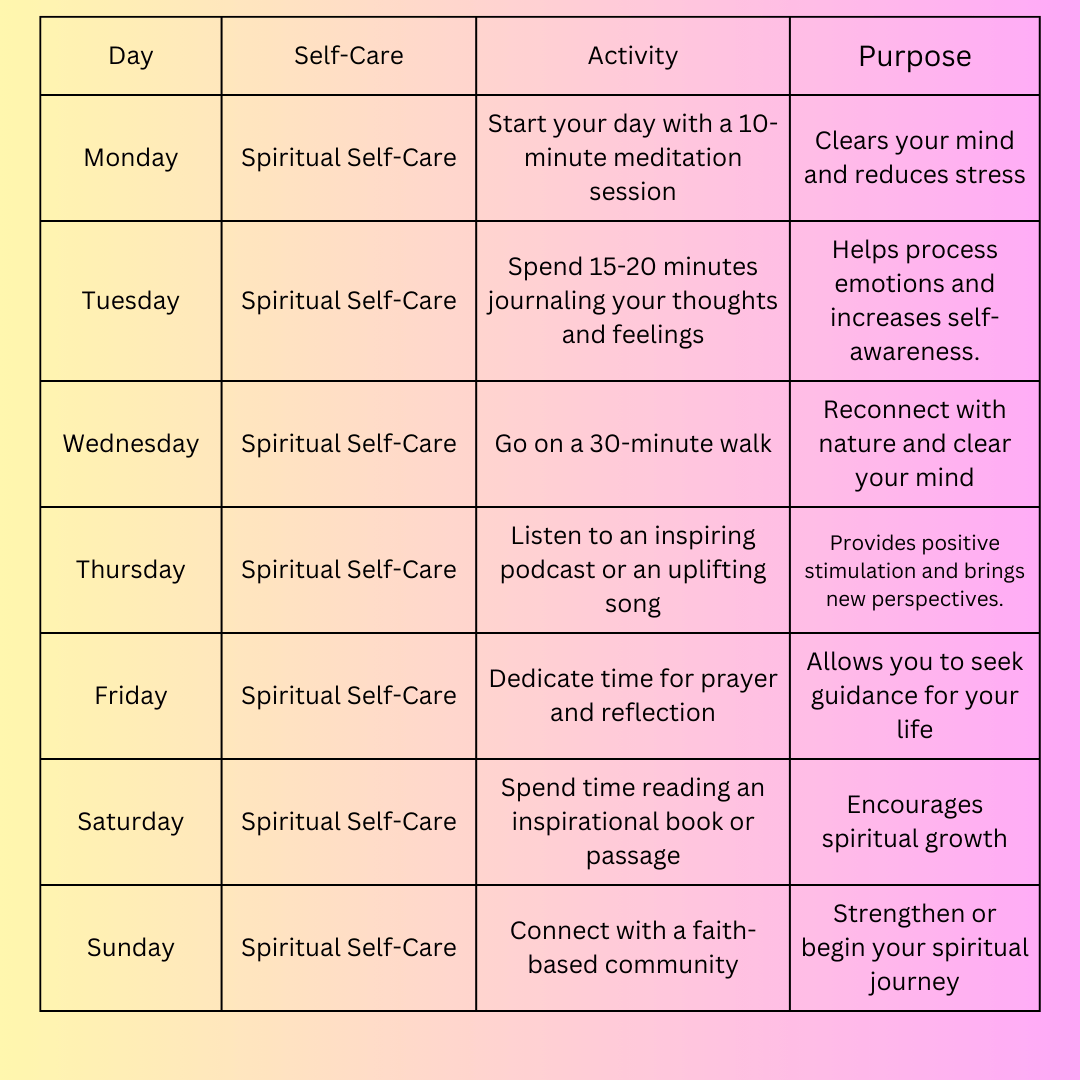The term “self-care” has become a buzzword—something everyone talks about, hears about, and often sees others indulging in. But for many, the idea of self-care feels inaccessible, like something you can’t afford to practice regularly. This gap may explain why so few people truly engage in it. With more people than ever experiencing anxiety, depression, and rising levels of burnout, why aren’t more of us prioritizing self-care?
Why Self-Care Feels Inaccessible—and Why It Matters Now More Than Ever
When you hear the word “self-care,” you might think of spa days, getting your hair and nails done, or treating yourself to a luxurious massage. While these activities certainly qualify as self-care, they’re only part of the picture. Self-care is simply the practice of taking action to preserve or improve your health. Put more simply, it’s about engaging in things that bring you peace and joy. It’s important to note that self-care doesn’t have to cost money—it only requires a willingness to prioritize yourself. Since each person’s self-care needs vary based on factors like age, gender, lifestyle, and preferences, how you take care of yourself will be unique to you.
In today’s fast-paced world, self-care is more critical than ever. The demands of daily life make it feel challenging to find even a little time to check in with ourselves and do the things that recharge us. Work, family, and other commitments often take priority, leaving little space for personal well-being. Without incorporating intentional self-care, burnout can creep in quickly. While most of us aspire to be healthy and happy, we may not always know how to get there—or stay there. That’s where self-care comes in. If you’re interested in creating sustainable self-care practices for a more balanced, fulfilling life, continue reading—I’ll be sharing simple, practical ways to incorporate self-care into your daily routine.
Before we get started, take a moment to reflect on areas in your life you’d like to improve to feel more balanced. This reflection can provide clarity as you start your self-care journey, helping you identify where you want to begin and how you want your self-care practices to look and feel to you. With this self-awareness, you’ll be better equipped to adopt habits that truly meet your personal needs.
While there are many ways to engage in self-care and many areas to begin your journey, I believe the most effective areas to start with include physical, mental and emotional, and spiritual self-care.
The Importance of Physical, Mental/Emotional, and Spiritual Self-Care
Physical, mental/emotional, and spiritual self-care are fundamental because they address the core aspects of a person’s overall well-being. We are each made up of mind, body, and spirit, making it essential to nurture our physical, mental, emotional, and spiritual health daily. For this blog post, I have combined both mental and emotional self-care because they are very much connected to each other, which can cause them to overlap. So, how do we start to implement these self-care ideals into our lives on a daily basis? First, it may help to understand each of these areas to better determine how they will fit into your life while on your journey.
Self-Care Is Taking The Time To Stop And See About Ourselves.
– Montoya
Physical Self-Care
Physical self-care is about maintaining physical wellness through practices that support your body’s health and energy. This can include regular exercise to keep your body strong, nourishing yourself with balanced nutrition, and prioritizing quality sleep to allow for rest and recovery. Physical self-care also involves everyday practices like staying hydrated and maintaining personal hygiene, all of which help you feel refreshed and energized. By committing to these small, consistent habits, you create a strong foundation for both your mental and emotional well-being.
Key Components of Physical Self-Care
Exercise and Movement
Practice moving your body daily by engaging in physical exercise or aerobics, walking, or yoga. These activities bring physical health to your body while boosting your mood, providing clarity, and promoting muscle strength.
Nutrition and Hydration
Incorporate nutritious foods into your diet by including servings of fruits and vegetables while continuously staying hydrated throughout the day with water. I like filling up a large water bottle and carrying it with me throughout the day. The goal is to have it empty by the day’s end. This way, I’ll know that I have reached my necessary water intake for that day.
One simple way to stay on track with hydration is by using a high-quality, well insulated water bottle that makes it easy to carry with you wherever you go. The KIVY Slim Insulated Water Bottle is a great choice for staying accountable with your daily hydration. It’s designed to help drinks stay cold for hours. Its slim build makes it both stylish and highly portable. Plus, it comes in a variety of fabulous colors–so choosing one that fits your style is made simple!
If you’re looking for an easy-to-carry water bottle to help meet your hydration goals, check out the KIVY Slim Insulated Water Bottle here → https://www.amazon.com/dp/B0C1GRZ4WN?ref=t_ac_view_request_product_image&campaignId=amzn1.campaign.2NM9GYUMPNKEQ&linkCode=tr1&tag=theleisuretea-20&linkId=amzn1.campaign.2NM9GYUMPNKEQ_1739562741923
Making hydration a daily habit doesn’t have to be difficult. With the right tools and a little consistency, you’ll feel the benefits of staying properly hydrated throughout your day!
Sleep
Getting enough rest throughout the night with good, uninterrupted sleep helps in recharging and healing your body. It also helps improve mood and memory. Allowing your body the amount of time it needs to rest, makes it easier to function properly for the next day.
Rest and Relaxation
Proper rest and relaxation can help improve your mood and the way you interact with others. Incorporating rest and relaxation on your physical self-care journey should never make you feel guilty. I have been there, sitting on the sofa with my legs propped up watching Lifetime-feeling like I should be doing something else on my never ending to-do list. Allow yourself the freedom to be intentionally nonproductive from time to time. In today’s fast-paced world where the expectation to do more, take on more, achieve more, and be more is constant, taking time to sit and relax—whether it’s indulging in a little Netflix or simply doing nothing, can have a positive impact on your health and well-being. Of course, like anything else, everything should be done in moderation. As you begin to implement this practice into your self-care routine, you’ll likely feel more calm, more relaxed, and more centered, which means releasing built-up stress, tension, worry, and anxiety. Give yourself that mindful nonproductive time to unplug and unwind.
Personal Hygiene and Care
Stay mindful of your daily hygiene habits like showering regularly, brushing your teeth twice a day, washing your face, and keeping your hair clean and conditioned. Make it a point to take care of your nails, whether that means getting them professionally done or doing them yourself. If you are not already doing this, begin prioritizing a daily vitamin routine, especially if you know your diet is not where it should be. Make it a habit of taking them at night before bed or in the morning before breakfast. These habits allow you to feel more confident within yourself, and with that sense of confidence, your overall physical self-care improves.
Why Physical Self-Care Matters
We all want to be physically healthy, aware of our bodies, and mindful about what we are putting in them. Physical self-care matters because it helps promote our overall health and wellness by giving our bodies the strength, confidence, energy, and self-awareness it needs to function properly. It helps us reduce stress, improve our mood, lower our risks of certain diseases, and it makes us feel good overall knowing that we are taking care of ourselves in a way that brings us into a healthier alignment with our physical being.
Simple Ways to Incorporate Physical Self-Care into a Daily Routine
As you begin your physical self-care journey, take into consideration that this journey does not have to be anything fancy or overwhelming. Starting with simple steps will allow you to sustain your routines as well as incorporate new ones along the way. Using this daily self-care chart to implement your Physical Self-Care journey is a practical way to begin today. Each day, engage in some way with your body for optimal gains. If you miss a day, don’t get down on yourself-pick up on the next day and begin again. The point is to start somewhere and in time, your consistency will build.
To implement my 30-day self-care challenge, click here for a FREE download and begin today. https://theleisureteacher.org/wp-content/uploads/2024/10/Colorful-Minimalist-30-Day-Self-care-Challenge-Planner-1-2.pdf
Mental and Emotional Self-Care
Mental self-care is about cultivating and maintaining a positive mindset to balance your thoughts and feelings in a healthy and productive way, while emotional self-care centers around understanding and balancing your feelings. One may argue that your mental and emotional self-care could be one of the most important aspects of good health since both involve calming and strengthening the mind for optimal well-being. A healthy mind can positively influence your entire body, allowing your overall health to benefit greatly.
Key Components of Mental and Emotional Self-Care
Positive Thinking and Maintaining a Growth Mindset
Practice seeing the good in every situation rather than the bad. Set your mind to focus on the solution of a problem instead of the problem itself. Be patient and kind to yourself when you make a mistake, or fall short of any goals or plans that you had set for yourself, and view them as opportunities to learn and grow. Always remember to celebrate your wins, no matter how small they may seem. Practice mindfulness by staying present in the moment, letting go of the past, and surrendering your worries about the future.
Creating a Calming Environment
Creating a calming space can quickly lead to obtaining mental self-care. A calming space is an environment that relaxes you and brings a sense of comfort and peace. If you have a space that is messy and cluttered, this could be what’s causing you mental stress and anxiety. A decluttered space has many benefits-one being reducing stress. Try to set systems in place to keep your space neat, clean and tidy. For instance, choosing a day of the week to wash your clothes will keep either your closet or laundry room from becoming dirty and disorganized, or as soon as you finish cooking a meal, go ahead and start cleaning up the kitchen before you sit down to eat so that your space doesn’t become this overwhelming mess to tackle after you’re full, relaxed, and exhausted from the day. Putting these systems into action may take a bit of effort at first, but the reward is regaining control of your mental well-being.
Building Positive Relationships
No one enjoys being around negativity-whether its directed at themselves, others, or even towards you. This type of behavior can be emotionally draining and may impact your mood and peace of mind. Protecting your well-being is an essential part of mental and emotional self-care, which is why it’s so important to seek the company of supportive individuals who bring positive energy. Surrounding yourself with uplifting people not only enhances your mental health, but it can also attract other positive influences around you, encouraging a healthier and happier environment.
Rest, Relaxation, and Mindful Practices
Being well-rested begins with making sure you’re getting enough sleep at night so that your mind has the capacity to recharge itself. When you allow your body the ability to relax and unwind, your mind is able to do the same, which contributes to processing information better, makes focusing on daily tasks easier to manage, and promotes a sense of organization. Taking time out of your busy schedule to rest a bit can also allow you to practice mindfulness-staying in the moment of your relaxed awareness and keeping yourself free of distracting thoughts and worries.
Practicing Self-Awareness
Practicing self-awareness means having the ability to view yourself in a way that encourages reflection, personal growth, acceptance, and meaningful change in your life. It involves understanding who you are, why you think and feel the way you do, and also how you choose to show up for yourself on a regular basis. When you begin practicing self-awareness, you will be better equipped to process your thoughts and feelings-ultimately enhancing your mental and emotional well-being.
Why Mental and Emotional Self-Care Matters
Mental and emotional self-care are important because they help you to effectively manage daily stress and support clarity in your thoughts and decision-making. To enhance these areas in your life, consider practices such as journaling your thoughts to organize and declutter your mind, setting boundaries to protect your personal space and well-being, and incorporating mindful exercises that keep you present and in the moment. Implementing these habits will serve as a great starting point to mental and emotional clarity.
Simple Ways to Incorporate Mental and Emotional Self-Care into a Daily Routine
Mental and emotional self-care can be achieved through a variety of activities, many of which have been outlined in the self-care chart below. Practicing mental and emotional self-care on a daily basis can promote a sense of calm, relaxation, and peace. These activities can help in reducing your stress levels and bring clarity to your mind-supporting your overall health and wellness. By incorporating these practices regularly, your mood and mental state will improve, leaving you in a more balanced and positive space.
To implement my 30-day self-care challenge, click here for a FREE download and begin today. https://theleisureteacher.org/wp-content/uploads/2024/10/Colorful-Minimalist-30-Day-Self-care-Challenge-Planner-1-2.pdf
Spiritual Self-Care
When was the last time you worked on your spiritual self-care? You’re probably thinking to yourself, “what is spiritual self-care?” Spiritual self-care is anything that helps you develop a deeper sense of purpose, meaning, and understanding that aligns with your values and beliefs. Spiritual self-care is not limited to religion, it can be gained through various practices like prayer, meditation, engaging with your faith community, spending time in nature, and journaling. These practices stimulate your inner being, bringing you in close connection with a higher power.
Key Components of Spiritual Self-Care
Prayer
Many people understand what prayer is, however, not everyone knows how to pray. All prayer is, is a conversation with a higher power expressing your gratitude, sharing your thoughts, and opening up about your feelings. This practice can be done at any time, and anywhere. Prayer is a way of bringing you closer to your higher power and establishing a relationship with your creator. Think about meeting someone new. The way you begin to establish a relationship with them is through conversing on a regular and daily basis. This is how prayer works. The more you engage in it, the more you feel closer to your higher power, strengthening your spiritual self-care journey.
Meditation
Meditation is a practice where you allow your mind to achieve ultimate relaxation while maintaining focus and gaining mental clarity. Meditation is about practicing mindfulness, which is being present in the moment; not pondering on the past or worrying about the future. It’s about being focused on the here and now of your life at the present moment. Practicing meditation through mindfulness gives you the ability to center yourself in a way that brings you into a spiritual alignment with your life’s desires, your personal beliefs, and the values you hold close.
Engaging With Your Faith Community
Practicing spiritual self-care is a deeply personal and individual journey for everyone. There is no right or wrong way to implement spiritual self-care in one’s daily life. Some people engage in spiritual self-care by attending church on Sundays, visiting Mosques, or participating in other religions services depending upon their traditional beliefs or upbringing. Our faith communities can serve as a sense of belonging, providing an environment for spiritual growth. Within these communities, we may hold similar beliefs and values that help to shape who we are and who we are becoming on our spiritual journey. Engaging with your faith community on a regular basis can provide a space for reflection and worship while also supporting both your mental and emotional health.
Spending Time In Nature
Contrary to certain traditional beliefs, spending time in nature is also a spiritual practice, and one that is rooted in the belief of being interconnected to our natural environment. This practice can provide healing to your mind and body, restoring and spiritually renewing you to a healthier and more balanced state of being. Spending time in nature has a way of teaching us gratitude for the simple blessings that we may sometimes take for granted like being able to see the beauty of our environment, or hearing the sounds of animals all around us going about and enjoying their day, or just being able to breathe and take in the fresh air provided to us. This practice can have a calming effect on our mental and emotional well-being, providing a sense of clarity on our spiritual self-care journey.
Journaling
The process of taking out a pen and paper to write down your thoughts and feelings can be a great way to check in with your inner self to truly understand what you are thinking and feeling in the present moment. Journaling is not a new concept. In fact, when we were younger, we called it “keeping a diary”. Back then, we didn’t realize we were practicing self-care-we simply wrote about everything happening in and around us. We were able to process our emotions and deal with them in a more positive and constructive way. This is how we should approach our journaling journey today. Journaling is an essential part of maintaining our spiritual self-care because it allows us to clean out the clutter in our minds by writing out what may be weighing us down mentally, emotionally, and spiritually. Think of journaling as cleaning out the clutter as you would a messy closet. Once the closet is cleaned out, you’re better able to stay organized, keep your clarity and focus, and make room for new possibilities.

Why Spiritual Self-Care Matters
We should all strive to be connected to something greater than our human selves and seek to be in alignment with us reaching the highest versions of who we are and are yet to become. This is why spiritual self-care matters. Spiritual self-care should be our compass on how we choose to navigate the life we have been given and pursue those things that bring us true happiness and joy; propelling us into our greater good.
Simple Ways to Incorporate Spiritual Self-Care into a Daily Routine
Getting started on your spiritual self-care journey does not have to be difficult or intimidating. If you’re unsure of where to begin, try to first assess where you are in your life and then determine what you want to accomplish on your journey. It might be a deeper connection with a higher power, establishing your prayer life, or just simply engaging more with your faith community. Wherever you decide to begin, keep in mind that this is your journey and everyone’s spiritual self-care path is not the same. The chart below outlines a few daily practices to get you started on your path.

To implement my 30-day self-care challenge, click here for a FREE download and begin today. https://theleisureteacher.org/wp-content/uploads/2024/10/Colorful-Minimalist-30-Day-Self-care-Challenge-Planner-1-2.pdf
Key Takeaways
- Self-care should not be something that’s done once you feel burnt out. Daily self-care practices will help you build consistency over time.
- Focusing on one self-care area each week makes the process of building your routines both manageable and effective.
- Take small steps toward your daily self-care routines. This will ensure that your practices gain consistency over time.
This post contains affiliate links. If you make a purchase through these links, I may earn a small commission at no additional cost to you. Thank you for supporting my blog!







